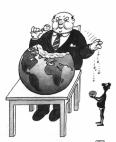Wednesday, June 28, 2006
U.S. At The Mercy Of The Mega-Rich

52 Senators voted for an increase in the minimum wage from $5.15 an hour to $7.25, but the Republicans killed it with a filibuster. At the same time they pushed through a bill for a repeal of the estate tax. Inheritances up to $5 million will not be taxed, and any amount beyond that will be taxed only 15 percent. So far, the supporters of the bill need only three more votes, and the scuttlebutt is that they will attempt to woo the Democratic Senators of Washington State with tax cuts to the timber industry. If this bill passes, it will deprive our deficit-beleaguered federal government of 760 billion tax dollars over a period of ten years - money that could have been spent to boost health insurance, fund works programs, and provide aid for child care, education and home owners. Behavior like this clues us in ever so well on whom our Congressional leadership really supports. And their actions aren't just hurting the poor.
According to Robert Kuttner, "The right has managed to savage the institutions that produced increasing opportunity and a broader middle class in the decades after World War II -- minimum wages, trade unionism, job-security, decent health and retirement plans, affordable college and housing, Social Security that rose with inflation, and economic regulation to keep Wall Street from grabbing most of the winnings. The middle class hasn't been so insecure since the depression. But today, unlike 1937, this epic reversal is off the political radar screen. The insecurity is experienced privately rather than as a national issue."
Former vice-presidential hopeful John Edwards has recently spoken out on the moral imperative to end poverty in America, but the real divide is not between the poor and the rest of us. It is between the rich and the rest of us. Four out of five Americans have not moved forward at all economically since the 1970's, while the top one percent have benefitted beyond their wildest imaginings - or anybody else's wildest imaginings either. Politicians love to speak for the majority, but who is speaking now for that forgotten 80 percent?
"Survival of the Richest" from The American Prospect

